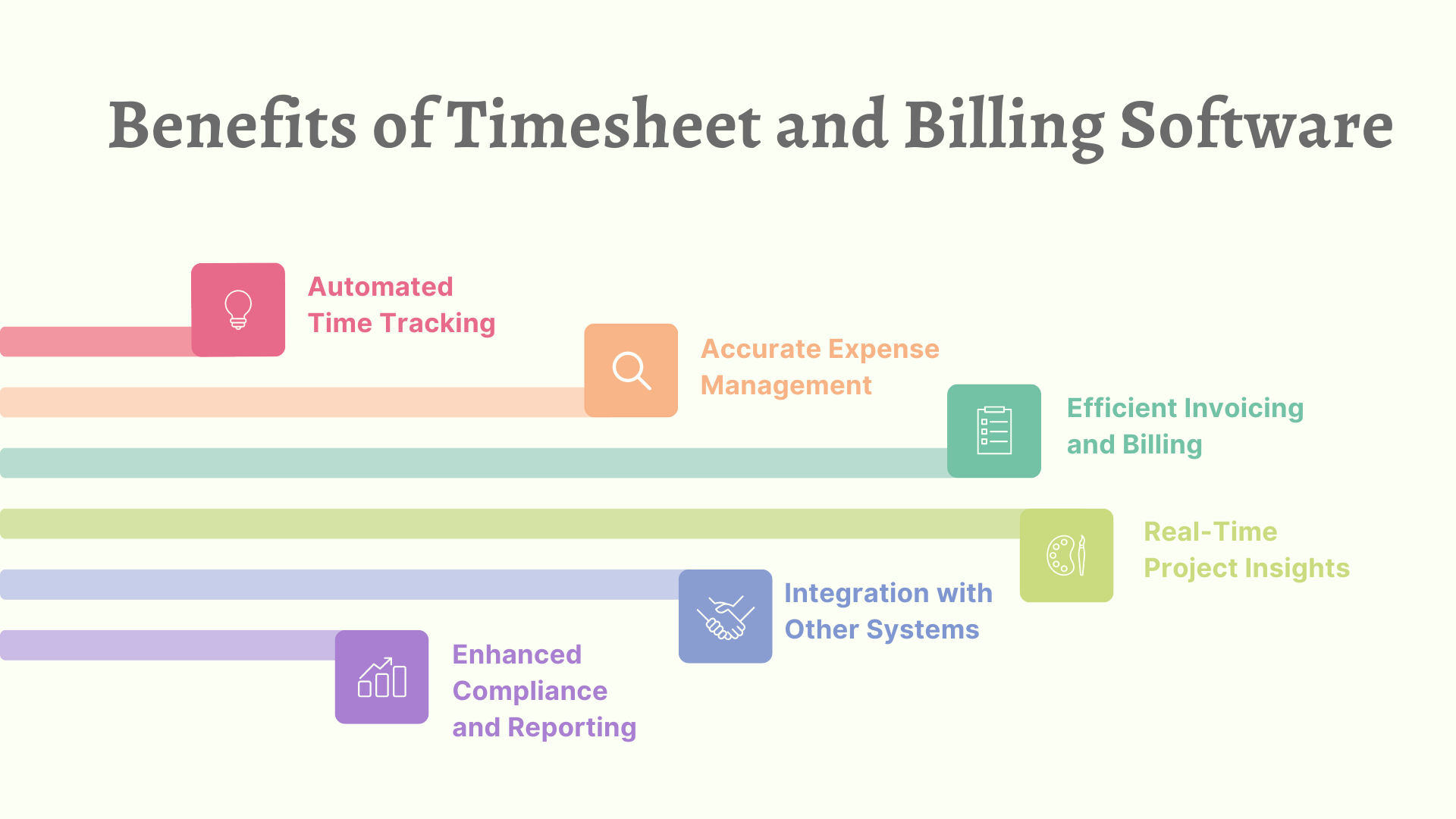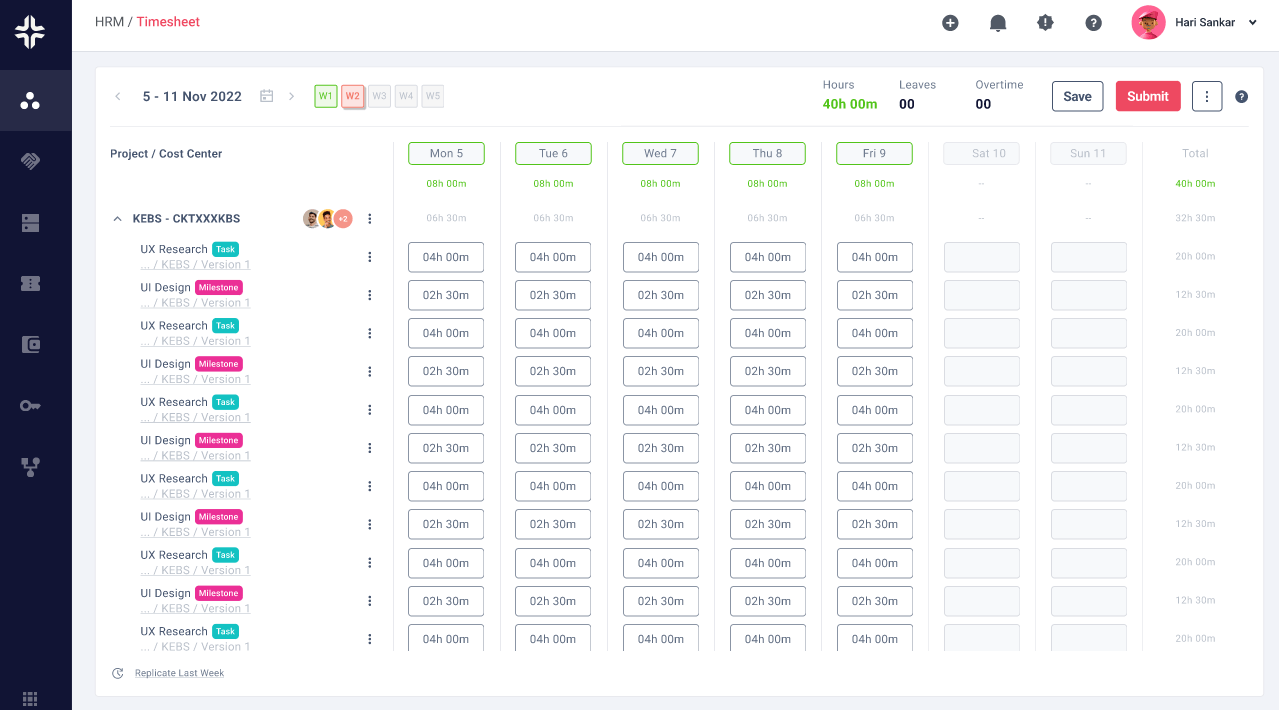
Home »
Automating Timesheet with Timesheet & Billing Software
Explore the benefits of automating timesheets using advanced timesheet and billing software.
Introduction
In today’s fast-paced business environment, efficient and accurate timesheet management is crucial for organizations to track employee time, allocate resources effectively, and ensure accurate client billing. Manual timesheet management processes are often prone to errors, time-consuming, and can lead to inefficiencies in project tracking and billing. However, with the advancements in technology, automating timesheet management has become a game-changer for businesses.
Automating timesheet management with dedicated timesheet and billing software offers a comprehensive solution to streamline and simplify the entire process.
This article will explore the benefits and best practices of implementing timesheet and billing software, highlighting how it can revolutionize the way businesses track and manage employee time.

The Importance of Timesheet Management
Timesheet management plays a crucial role in the efficient operation of businesses across various industries. It serves as a fundamental tool for tracking and managing employee time, resource allocation, project progress, and accurate client billing. The importance of timesheet management can be summarized as follows:
Timesheets provide a detailed record of the time spent by employees on specific tasks, projects, or clients. This data is essential for monitoring project progress, identifying potential bottlenecks, and ensuring that projects stay on track. Accurate project tracking allows businesses to allocate resources effectively and make informed decisions regarding project timelines, budgeting, and resource allocation.
Timesheets help businesses optimize resource utilization by providing insights into the availability and allocation of employees’ time. By tracking how much time is spent on different projects or tasks, managers can identify overworked or underutilized resources and make necessary adjustments to maximize productivity and efficiency.
Timesheet management encourages employee accountability and productivity. When employees are required to record their time spent on tasks, it promotes a sense of responsibility and ownership. It also enables managers to identify high-performing employees, recognize their contributions, and provide necessary support or training to improve performance.
Timesheets serve as the basis for accurate client billing. By recording the time spent on client projects or tasks, businesses can generate precise invoices that reflect the actual effort invested. Accurate billing enhances trust and transparency with clients, prevents revenue leakage, and ensures fair compensation for services rendered.
Timesheets provide valuable data and insights that enable data-driven decision-making. The recorded time data can be analyzed to identify patterns, trends, and areas of improvement. This information helps managers optimize processes, identify opportunities for automation, and allocate resources strategically.
Challenges with Manual Timesheet Management
Manual timesheet management poses several challenges, including:
- Human Errors: Manual entry of timesheets can lead to errors, such as incorrect time recording or calculation mistakes, compromising the accuracy of data.
- Time-Consuming: Collecting and processing timesheets manually is a time-consuming task for both employees and administrative staff, taking valuable time away from core business activities.
- Lack of Real-Time Insights: Manual processes often result in delayed availability of project data, hindering timely decision-making and project management.
- Inefficiency in Billing: Manual timesheet management can lead to delays in client invoicing, resulting in cash flow issues and potentially straining client relationships.
Benefits of Timesheet and Billing Software
Implementing timesheet and billing software offers numerous benefits, including:
- Automated Time Tracking
- Accurate Expense Management
- Efficient Invoicing and Billing
- Real-Time Project Insights
- Integration with Other Systems
- Enhanced Compliance and Reporting

Automated Time Tracking
Automated time tracking is one of the significant benefits of implementing timesheet and billing software. This feature eliminates the need for manual time entry and streamlines the entire process. With automated time tracking, employees can easily record their work hours and activities using user-friendly interfaces or mobile applications. The software automatically captures the start and end times, tracks breaks, and calculates the total hours worked. This eliminates the risk of human error and ensures accurate and reliable time records.
Automated time tracking also enables businesses to gain real-time visibility into employee productivity and project progress. Managers and stakeholders can access up-to-date timesheets, monitor work hours, and track project timelines. This allows for effective resource allocation, identification of potential bottlenecks, and improved project planning.
Furthermore, automated time tracking simplifies the payroll process. The software can seamlessly integrate with payroll systems, automatically transferring the recorded hours and eliminating the need for manual data entry or reconciliation. This not only saves time but also reduces the risk of payroll errors and ensures accurate and timely employee compensation.
Accurate Expense Management
Accurate expense management is another key benefit of implementing timesheet and billing software. This feature simplifies the process of managing and tracking expenses incurred by employees during project work or client engagements. Here’s how timesheet and billing software enhances expense management:
Timesheet and billing software provide a centralized platform for employees to submit expense reports. They can easily enter expense details, attach receipts, and categorize expenses based on predefined categories. This streamlined process ensures consistent and accurate expense tracking across the organization.
The software automates the expense approval process, eliminating the need for manual reviews and paper-based workflows. Managers can review and approve expenses digitally, saving time and reducing administrative overhead. Automated approval workflows ensure timely and efficient processing of expense claims.
Timesheet and billing software often integrate with financial systems, such as accounting or ERP platforms. This integration allows for seamless transfer of approved expenses to the financial system for reimbursement or billing purposes. It eliminates the need for duplicate data entry, reduces errors, and ensures accurate financial records.
Timesheet and billing software provide robust reporting capabilities for expense management. Managers can generate expense reports, analyze spending patterns, and gain insights into project-related expenses. This data enables informed decision-making, cost optimization, and identification of areas for process improvement.
Efficient Invoicing and Billing
Efficient invoicing and billing is a significant benefit of implementing timesheet and billing software. This feature streamlines the invoicing process, enhances accuracy, and improves overall efficiency. Here’s how timesheet and billing software facilitates efficient invoicing and billing:
Timesheet and billing software automates the generation of invoices based on the recorded time entries and billable rates. This automation eliminates manual calculations, reduces the risk of errors, and saves valuable time. Invoices can be generated in various formats and customized to match the organization’s branding.
The software accurately captures and consolidates time entries and expense records, ensuring that all billable hours and reimbursable expenses are accounted for. This accuracy enhances the integrity of the invoicing process and minimizes revenue leakage.
Real-Time Project Insights
Real-time project insights are a valuable benefit of implementing timesheet and billing software. This feature provides businesses with up-to-date and accurate information on project progress, resource utilization, and financial performance. Here’s how timesheet and billing software offers real-time project insights:
Timesheet and billing software allow businesses to track and monitor project activities in real-time. Project managers can access detailed information on tasks, milestones, and overall project status.
With real-time project insights, businesses can monitor resource utilization effectively. The software provides visibility into employee workloads, availability, and allocation. This helps in optimizing resource allocation, identifying underutilized or overburdened team members, and making informed staffing decisions.
Timesheet and billing software offer analytics and reporting features that provide valuable insights into project performance. Managers can generate reports on key performance indicators (KPIs), such as project profitability, billable hours, project milestones achieved, or resource productivity. These analytics enable data-driven decision-making, performance evaluation, and the identification of areas for improvement.

Integration with Other Systems
Integration with other systems is a significant benefit of implementing timesheet and billing software. This feature allows seamless data exchange and collaboration between different software applications used within an organization. Here’s how timesheet and billing software facilitates integration with other systems:
- Accounting Systems: Timesheet and billing software often integrate with accounting systems. This integration enables the automatic transfer of financial data, including invoices, expense records, and payment information. It eliminates the need for manual data entry, reduces errors, and ensures consistency between timesheets, billing, and financial records.
- HR and Payroll Systems: Timesheet and billing software can integrate with HR and payroll systems to streamline employee management and payroll processes. This integration ensures accurate recording of employee hours, facilitates payroll calculations, and simplifies employee data synchronization. It reduces manual data entry, minimizes errors, and improves payroll accuracy.
| Integration with Other Systems | How Timesheet and Billing Software Facilitates Integration |
| Accounting Systems | Automatically transfers financial data like invoices, expenses, and payments. Eliminates manual data entry, reduces errors, and ensures consistency. |
| HR and Payroll Systems | Streamlines employee management and payroll by integrating with HR and payroll systems. Ensures accurate recording of hours, simplifies payroll calculations, and minimizes errors. |
Enhanced Compliance and Reporting
Enhanced compliance and reporting capabilities are key benefits of implementing timesheet and billing software. This feature enables businesses to maintain regulatory compliance, adhere to industry standards, and generate accurate reports for various stakeholders. Here’s how timesheet and billing software enhances compliance and reporting:
- Regulatory Compliance: Timesheet and billing software often come with built-in compliance features that help businesses adhere to legal and regulatory requirements. It enables businesses to track and document billable hours, overtime, and other important time-related information in accordance with labor laws and regulations. This ensures compliance with wage and hour regulations and minimizes the risk of penalties or legal issues.
- Audit Trail: Timesheet and billing software maintains a comprehensive audit trail of all time entries, expenses, and billing activities. This audit trail provides a detailed record of who performed what tasks, when, and for how long. It ensures transparency and accountability, making it easier to demonstrate compliance during internal or external audits.
- Accurate Reporting: Timesheet and billing software enables accurate and timely reporting for various purposes. Businesses can generate detailed reports on billable hours, project costs, revenue, and other financial metrics. These reports provide valuable insights into project profitability, resource utilization, and overall financial performance. Accurate reporting supports informed decision-making, facilitates budgeting, and helps identify areas for improvement.
- Invoicing Compliance: Timesheet and billing software assists in maintaining invoicing compliance by generating accurate and standardized invoices. It ensures that all billing information, such as rates, taxes, and discounts, is correctly applied. Compliance with invoicing requirements helps build trust with clients, avoids billing disputes, and contributes to positive business relationships.
Power of KEBS Unified Time-Tracking Platform

The power of KEBS Unified Time-Tracking Platform lies in its ability to streamline and optimize time tracking processes, providing numerous benefits for businesses. Here are some key advantages of KEBS Unified Time-Tracking Platform:
- Centralized Time Tracking: KEBS offers a centralized platform for time tracking, eliminating the need for multiple tools or spreadsheets. Employees can easily log their time spent on different projects or tasks, providing a consolidated view of time data.
- Increased Accuracy: With KEBS Unified Time-Tracking Platform, time tracking becomes more accurate and reliable. Employees can track their time in real-time, reducing the chances of manual errors or inaccuracies associated with retroactively filling out timesheets.
- Improved Productivity: By automating time tracking processes, KEBS frees up employees’ time, allowing them to focus more on their core tasks and responsibilities. It eliminates the manual effort of time recording and provides a seamless experience, enhancing overall productivity.
- Enhanced Project Management: The Unified Time-Tracking Platform integrates with KEBS project management features, enabling project managers to monitor and analyze time spent on various tasks and projects. This data helps in resource allocation, project scheduling, and identifying areas of improvement.
- Streamlined Invoicing: The Unified Time-Tracking Platform seamlessly integrates with KEBS billing and invoicing functionalities. It automates the process of converting tracked time into billable hours, generating accurate invoices for clients or internal departments.
| Advantages of KEBS Unified Time-Tracking Platform | Key Benefits |
| Centralized Time Tracking | Consolidated platform for time tracking, eliminating the need for multiple tools or spreadsheets. Employees can log time spent on projects/tasks. |
| Increased Accuracy | Real-time time tracking reduces manual errors or inaccuracies associated with retroactively filling out timesheets. |
| Improved Productivity | Automation of time tracking frees up employees’ time, allowing them to focus on core tasks and responsibilities. Enhances overall productivity. |
| Enhanced Project Management | Integration with KEBS project management features helps monitor and analyze time spent on tasks. Aids resource allocation, project scheduling, and identifying areas of improvement. |
Conclusion
Automating timesheet management with timesheet and billing software brings significant advantages to project-based businesses. By leveraging automated time tracking, accurate expense management, efficient invoicing and billing, real-time project insights, integration with other systems, and enhanced compliance and reporting, businesses can streamline operations, improve accuracy, save time, and enhance overall productivity.
Investing in timesheet and billing software not only optimizes internal processes but also contributes to better client relationships, improved financial management, and increased profitability.
KEBS – PSA Software helps to streamline organization efficiency and improve overall productivity by using time tracking software.
Contact us to know more!









